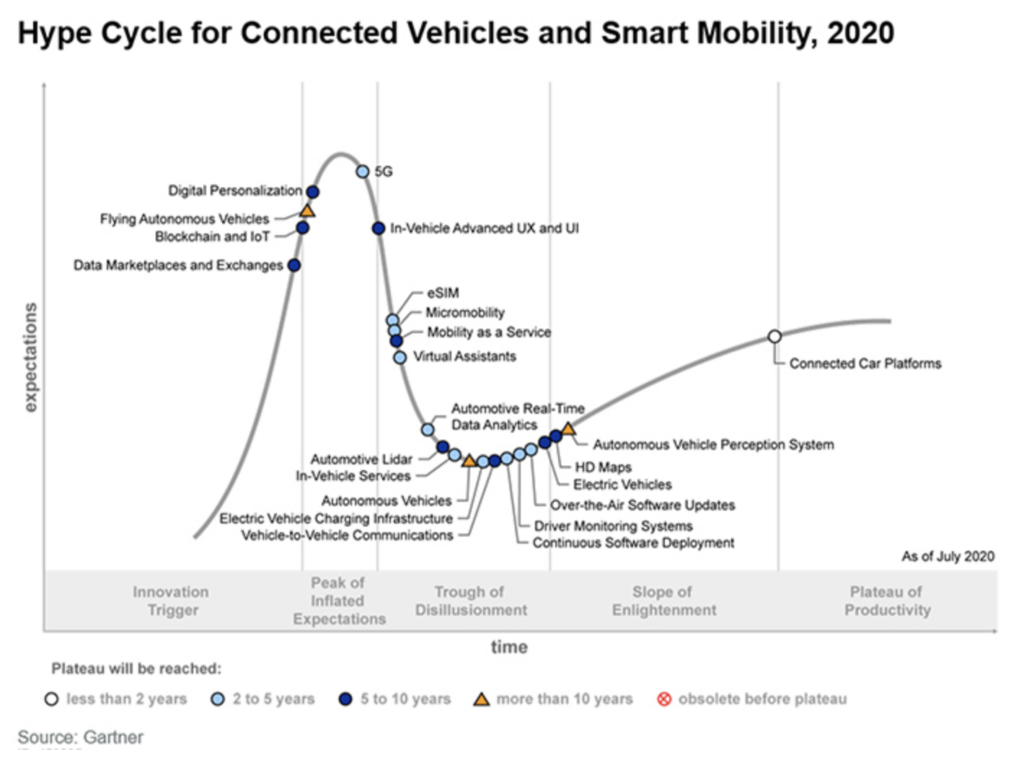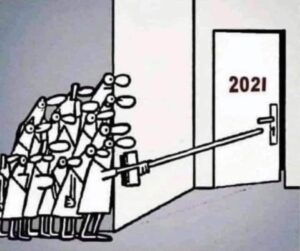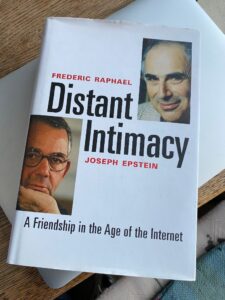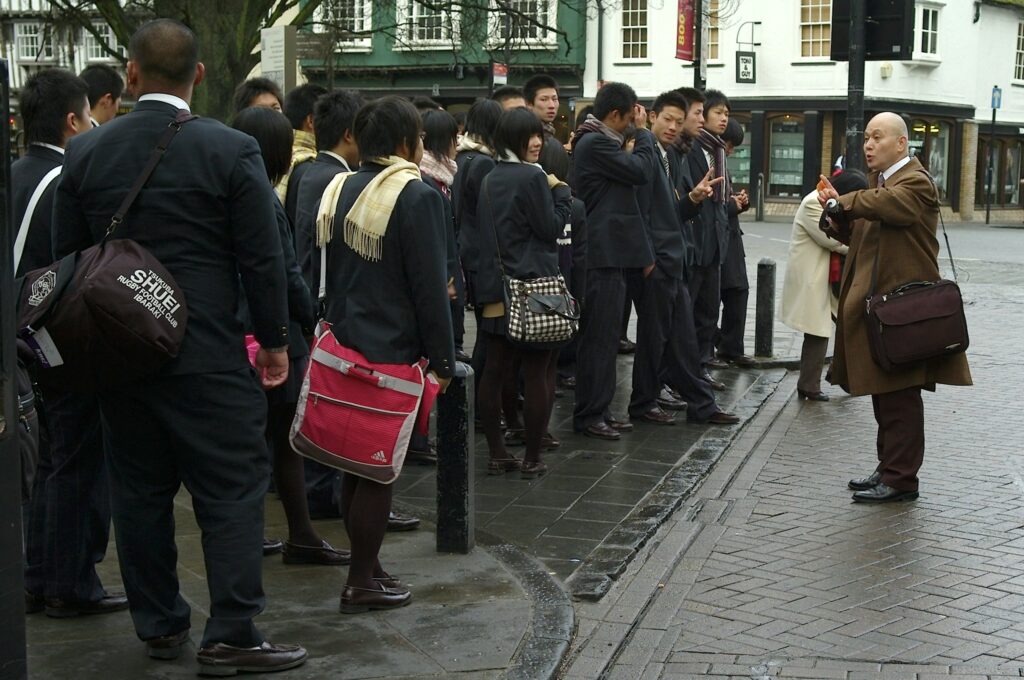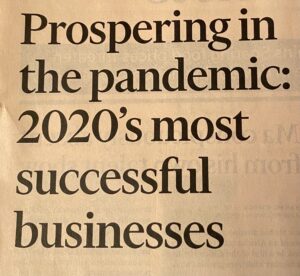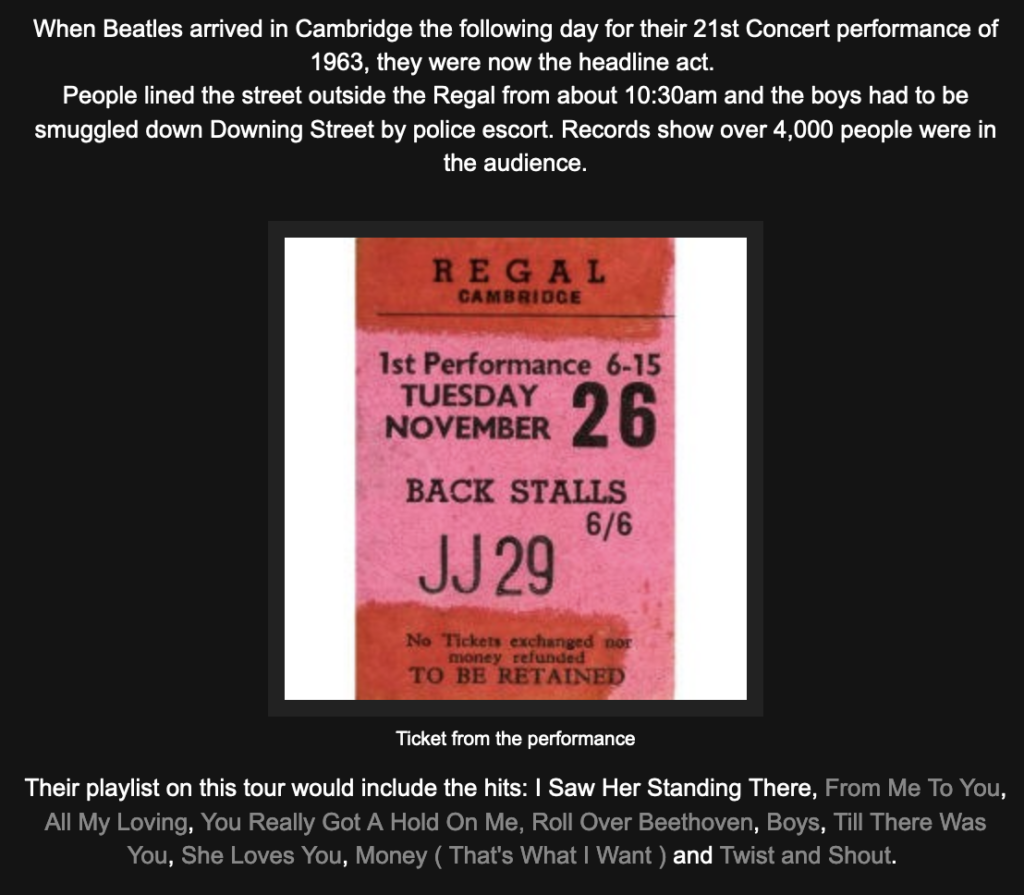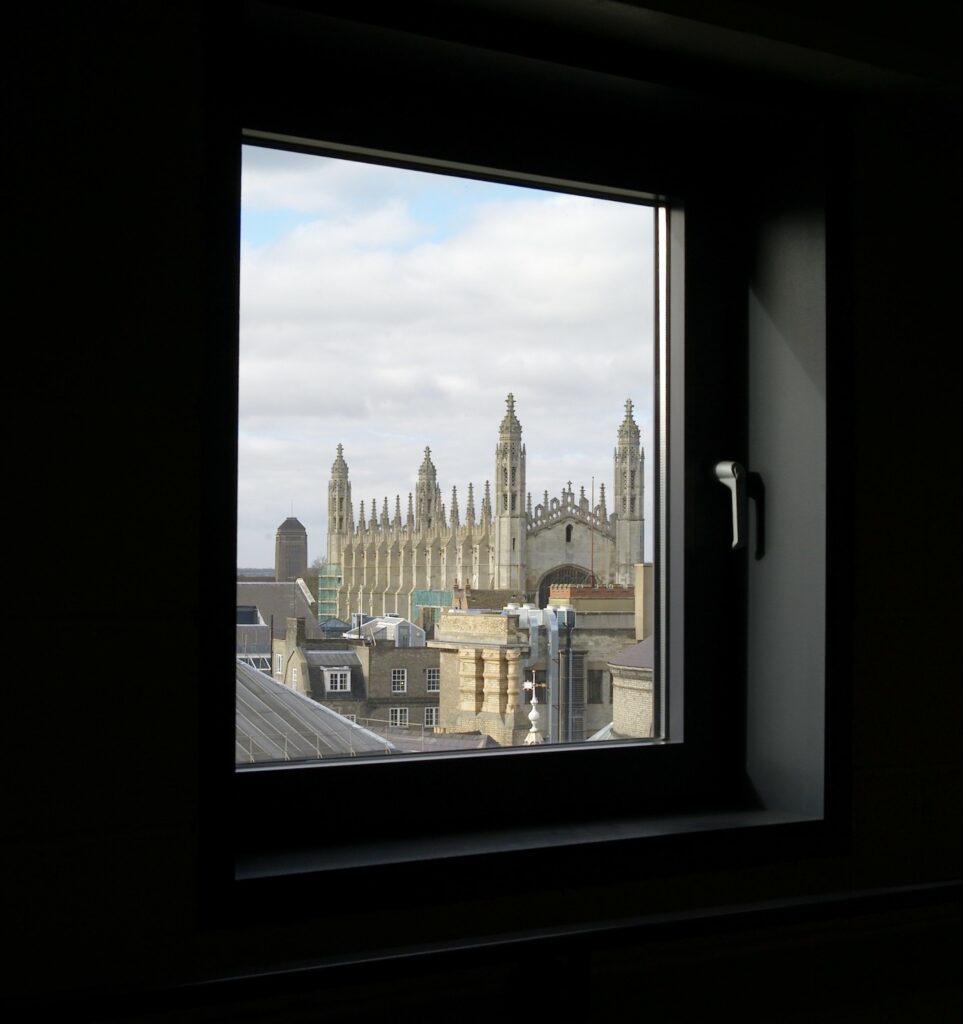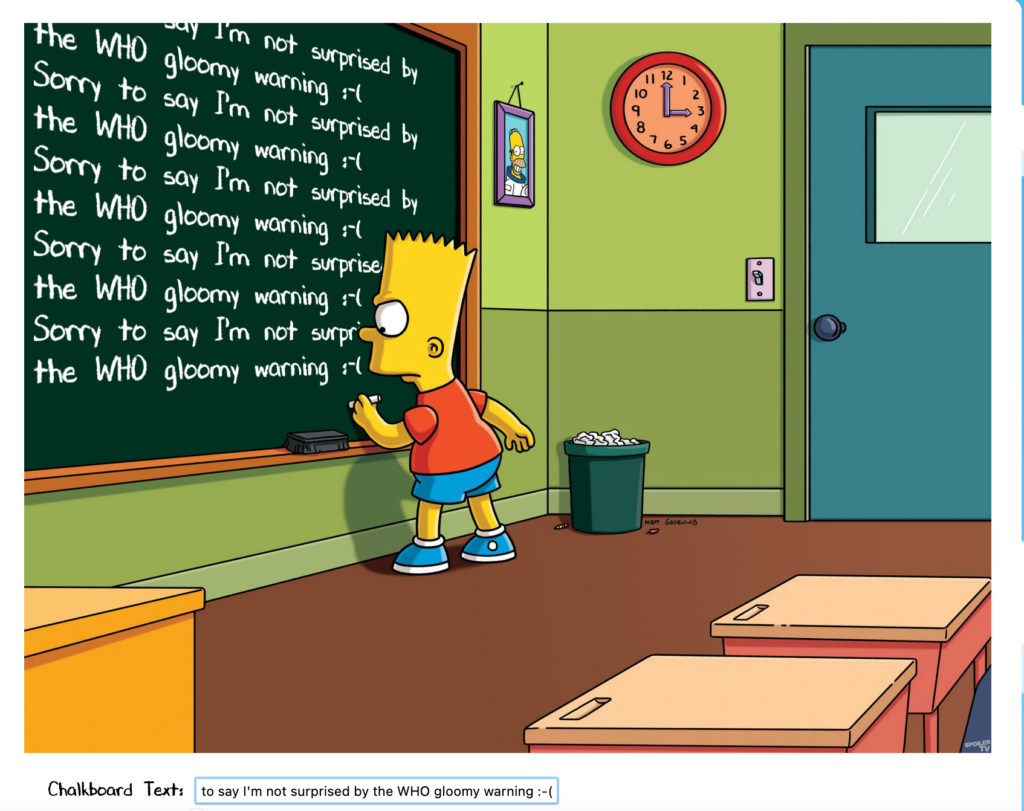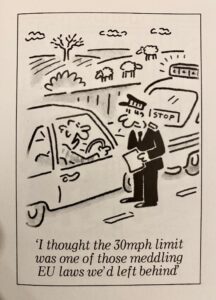Newton’s apple tree
The tree in the garden of Isaac Newton’s home in Woolsthorpe, Lincolnshire. It’d be nice to think that it’s a descendant of the one from which the apple apochryphally fell on his head, prompting his musings about gravity.
One of my favourite cartoons shows the young Isaac rubbing the bump on his head and saying: “Now comes the hard part — getting a research grant to write it up.”
Quote of the Day
”All I’ve got against golf is that it takes you so far from the clubhouse.”
- Eric Linklater
(This for Ivan Morris, a talented golfer who is currently recovering from a bad fall.)
Musical alternative to the morning’s radio news
Alistair Anderson, Richard Thompson & Kathryn Tickell Link
If you’ve never heard the glorious sound of Northumbrian pipes before then this is your chance.
Long Read of the Day
Economics with a Moral Compass Link
Really long (13,700 words) but worth it. Transcript of a conversation between two Nobel laureates — Amaryta Sen, and Angus Deaton — and Tim Besley of LSE. It’s 13,700 words, so you need to make an appointment with yourself and get some coffee. But if you’re interested in the modern history of economics, or how the discipline got to be the way it is, this is just great.
Here, for example, is Sen remembering Joan Robinson, the great, imperious maverick of the Cambridge Economics Faculty:
I don’t know how to describe a person as other than “vigorously intolerant” when she told me, as my PhD supervisor, that “I have read the first chapter and a part of the second, and it’s the kind of thing that will be praised by established economists, and you will have no difficulty in getting your PhD.” At Cambridge, your supervisor is not one of your examiners, unlike in America. She said, “I’m not going to read the rest of your thesis.” I said, “But you’re supposed to say that the thesis is fit to be submitted for the PhD.” She said, “I will say it.” So I asked her, “On what basis?” “On the basis of what I have read already.”
The thesis had eight chapters, by the way. She said, “It’s good. Clearly, clearly, it’s good. Good in the way that these people understand it. But it’s not worthy of you. You have to promise me that someday you will come back to real economics.” I don’t know whether “vigorously” or not, but she was certainly intolerant of what I wanted to work on.
I had an odd relationship with her, but I liked her very much. She was very kind to me, took great interest even in my personal life. Later on, when my marriage with Nabaneeta broke up, she commanded me to come and see her, and told me that Nabaneeta and I should not go for a divorce. I didn’t say, “None of your business.” She said, “It’s a bad thing once you have children”—and we did have two children—“it’s very bad for the children.” In a sense, she was describing her own life, when she didn’t break up despite the distance between her and her husband. I knew that she never wanted anything other than the best thing for me, as she understood it.
To predict government policy, listen to Boris and wait for the opposite
John Crace on Boris Johnson’s incapacity.
At one time Crace seemed to fit perfectly the mould of the Parliamentary sketch-writer: witty, irreverent, observant of petty but revealing detail, etc. He’s still all of those things, but his observation of Boris Johnson’s manifest unsuitability as Prime Minister has been so devastatingly accurate that we no longer laugh. This is way beyond a joke.
It’s now becoming easier and easier to predict government policy. Just listen to what the prime minister said in the morning and the opposite is likely to be true come the middle of the afternoon. It’s almost like clockwork – the government does what most reasonable people would have done several weeks earlier.
At every stage in the coronavirus pandemic, the government has been hopelessly behind the curve. From being late to lockdown in March while the Cheltenham festival and Carrie Symonds’s baby shower went ahead. From ignoring the Sage advice in September for a second national lockdown and being forced into one in November by both Keir Starmer and the rapidly rising rates of infection. From announcing a five-day Christmas free-for-all in early December – everyone knew Covid liked to take time off over the holiday period – which he then had to cancel after everyone had already made their plans.
During the biggest national health crisis in 100 years, it’s just our luck to have Johnson in charge. A man pathologically unable to make the right calls at the right time. The prime minister is a narcissistic charlatan. The Great Dick Faker. Someone who can’t bear to be the bearer of bad news or to be proved wrong by people who disagree with him. So he stubbornly ignores the evidence until he becomes overwhelmed by it and public opinion has turned against him. He isn’t just a liability as a leader, his indecision has cost lives. His hubris will only cost him his job.
“The mother of all U-turns”
From Politico:
MOTHER OF ALL U-TURNS: The schools debacle marks one of the most mind-melting U-turns yet in the short history of this government. Here’s a brief timeline of how it played out … December 14: Williamson threatened councils in Greenwich and Islington with legal action, forcing them to keep schools open despite rising COVID cases … December 21: Williamson said mass-testing meant schools can reopen in the new year … December 22: SAGE advised ministers to close schools in January … December 31: Williamson delayed secondary school reopening by two weeks, but told primary schools in much of London they should reopen … January 2: Williamson U-turned on London primary schools and kept them closed, but said other primaries across England should open … January 3: The PM told Andrew Marr there was “no doubt in my mind that schools are safe” and told primaries to reopen the following day … But schools across the country defied the order and emailed parents to say they were shutting … January 4: In the morning, DfE civil servants were told there were no plans to close schools or cancel exams (h/t John Johnston) … In the evening, Johnson shut all schools for seven weeks and canceled exams this summer.
‘Peak hype’: why the driverless car revolution has stalled
At one level, the driverless car project has been a surprising success — in the sense that it succeeded in getting autonomous vehicles to the level where they are remarkably capable in some contexts. But getting them to the point where they would be accepted as real alternatives to human-driven vehicles in all environments — the last 20% — turns out to be really, really hard. And of course it would require significant changes to urban areas and country roads on a significant scale. So, despite the hype it turns out that reality is a hard master — as this Guardian piece says.
Reading it made me wonder what the Gartner Hype Cycle for autonomous vehicles would look like. So I went searching. It looks like this:
Trump’s authoritarian moment is here
John Cassidy in the New Yorker.
If there were any doubt remaining that Donald Trump still represents a dire threat to American democracy, the events of this weekend dispelled it. As a new Congress gathers to confirm that the voters chose Joe Biden to be the next President, a proceeding that should be a mere formality, Trump is desperately trying to overturn the result and stay in office. Even more disturbing, large numbers of elected Republicans are joining in this unprecedented effort to reject the popular will. If the Republic gets through the next two weeks without a catastrophe, we must surely take steps to protect ourselves against the next would-be authoritarian, which could well be Trump himself in 2024.
It is like we are living in a horror movie, and just when we think it’s over, the monster comes back, stronger than ever.
My private nightmare, listening to Boris Johnson last night, is that this virus will overwhelm the capacity of even rich states to subdue it. That, in the end, we will just have to let it rip.
Pessimistic? Probably. But then I read Tyler Cowen’s latest Bloomberg column. The heading on this post is actually the last line of the column.
Preliminary data indicate that the new strain in the U.K. allows the virus to spread from one person to another more easily. The practical upshot is that even the strict lockdowns of early 2020, such as the one just ordered in the U.K. by Prime Minister Boris Johnson, may not be enough to reverse the spread of the virus.
It is far from obvious that politicians will be able to sell voters on strict lockdowns if they still allow the virus to spread. Furthermore, vaccine distribution has been sufficiently slow that a full lockdown would have to last for many months, and that probably isn’t feasible or desirable. Yet not having lockdowns would lead to a much more rapid spread of the virus, overloading hospitals and public health facilities.
It’s hard to come up with the moral language to compare those outcomes when all of them are unacceptably bad. Trust in elites is already weak in the U.S., and it is likely to wane further. Whatever one might think is the correct course of action, how exactly would or should a President Joe Biden present and defend it to the public?
He also points out the irony that the new variant could catch states that have done well at suppressing the original version of the virus, because they will have thought it less urgent to get on with vaccinating everyone.
I felt from the beginning that we in the West were underestimating the virus. I still think that’s true.
This blog is also available as a daily email. If you think this might suit you better, why not subscribe? One email a day, delivered to your inbox at 7am UK time. It’s free, and there’s a one-click unsubscribe if you decide that your inbox is full enough already!


